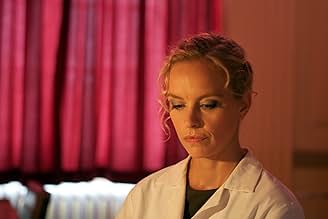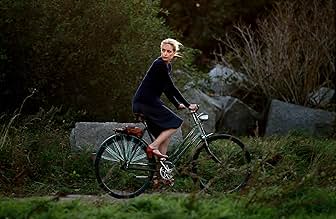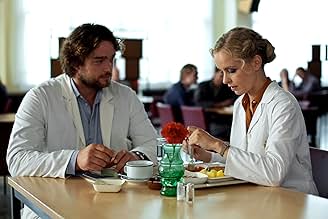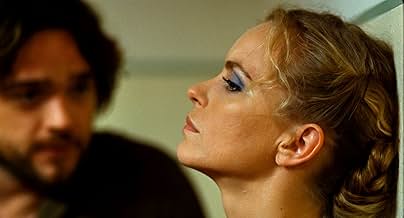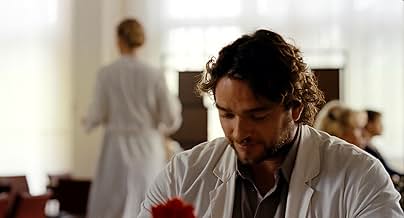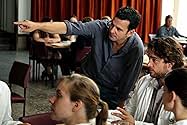IMDb-BEWERTUNG
7,2/10
16.695
IHRE BEWERTUNG
Eine Ärztin in der DDR der 80-er Jahre ist in einer kleinen Klinik auf dem Land gestrandet.Eine Ärztin in der DDR der 80-er Jahre ist in einer kleinen Klinik auf dem Land gestrandet.Eine Ärztin in der DDR der 80-er Jahre ist in einer kleinen Klinik auf dem Land gestrandet.
- Regie
- Drehbuch
- Hauptbesetzung
- Auszeichnungen
- 10 Gewinne & 24 Nominierungen insgesamt
Claudia Geisler-Bading
- Stationsschwester Schlösser
- (as Claudia Geisler)
Empfohlene Bewertungen
Yes, I worked in the old DDR. Living in London, and being a graduate engineer able to speak German, I was hired by a company importing machinery from the DDR to be their liaison man at the factory in East Berlin, and spent a number of lengthy periods over there in the late 60s and early 70s. I very much settled into working life there, and would socialise with the other engineers at the factory. I even had a local girlfriend for a while!
I recall the mindless bureaucracy, the often petty limitations on what everyone could do, and of course the ubiquitous police presence. In order to have my car to get around during these long tours of duty, I would usually take the ferry and drive there, and on one occasion I got harangued by a cop who told me my car was too dirty and that having a dirty car was strictly forbidden in the DDR!!
This movie depicts an era a decade later, and some things had changed. I remember many older people expressing considerable enthusiasm for their 'socialist utopia', largely because they felt their lives were massively better than under the Nazis and during the war years. But there was also a rising generation who wanted what people in the west had, a desire which had a particularly curious form of expression in Levi jeans! These were like gold dust, and sometimes at weekends I would pop through Checkpoint Charlie into West Berlin, and buy half a dozen pairs to give to my friends. Barbara and André were very much of that generation, Schütz was distinctly of the old guard.
So for me, the movie played out against a familiar background, and the agonising personal decisions this forced upon the central characters had great reality. Both Barbara and André were portrayed very much as caring doctors, placed in intolerable situations by the heavy and unfeeling hand of the state. The movie very cleverly kept us all in the dark, as we speculated how it might end. Well worth watching to find out!
It's a challenging task to depict a bygone era which hasn't yet passed into history, but is a living memory in the minds of many. Distant events may be easily interpreted at will, because no spectator can expect a minute reconstruction of a reality past. Adaptations of recent events, however, fall under close scrutiny of those who were actually there, and any attempt to 'tell the whole story' will invariably meet with criticism from those who feel left out of the picture, or who remember differently. It is therefore the best solution for the film maker to focus on atmosphere rather than events, and a simple story rather than a complex rendition of society as a whole. And that's what director/ screenwriter Christian Petzold does: he tells the story of a doctor, displaced from the capital to the province for an application to leave the country, and confronting an atmosphere of distrust while preparing her escape to the West. This routine of hostility is a little ameliorated by the interest of a male colleague, who may however be an assigned informer, and the friendship to a pregnant patient, who apparently escaped from a juvenile offenders camp only to be recaptured.
What makes me consider this film as far superior to the much lauded, Oscar-winning 'The Lives of Others' is that it does not sacrifice atmosphere to film making conventions. For instance, there is no music, because there was no music. 'The Lives of Others' tormented any actual witness of the times it described with a sappy soundtrack. It also did not correspond to my recollections of East Germany because it limited the supervision of ordinary citizens to the Stasi ('State Security') and its collaborators. It did point out that this supervision was omnipresent, but it created a division between good and evil which was slowly eroded from the evil side's end. 'Barbara', however, focuses on the way ordinary citizens, not intellectuals, were treated, and the fact that virtually everyone collaborated in the supervision of the individual, whether they were working with the Stasi or not. Barbara is fully aware of her situation, and tries to make friends with her colleague/informer André Reiser to win him over to her side, while at the same time not giving anything away about herself. Reiser, on the other hand, tries to gain her trust as a person, because he needs her competence at work and may be romantically interested in her, while at the same time fulfilling his obligations to report on her.
This constant game of hide and seek illustrates what Socialism was really like - a permanent grey zone in which you had to measure your steps carefully and no clear distinctions between good and evil existed, as 'The Lives of Others' would have you believe; and the young patient side characters show that quite a few cracked under this immense pressure. By focusing on one woman's story, director Petzold delivers an accurate portrait of the realities of life at that time: it did not matter whether you were good at your job or not, and being too good made you automatically suspicious, while being lazy made you the target of accusations of boycotting society; it was dangerous to open up to colleagues, because they would almost certainly be inquired about what you said, but at the same time it was dangerous to distance yourself, because then you'd be suspected of having something to hide. Everything was tactics, nothing was spontaneous, everybody wanted to get out, but chastised those who actually tried. This authenticity has probably prompted this film's selection as the German candidate for the foreign language Oscar 2013, but it may also have hampered its chances to win the Golden Bear upon its premiere at the Berlin Film Festival, where Petzold won the director's prize though. Realism makes for an accurate portrayal of the recent past, but for those who have not been there, 'Barbara' may be a bit too stiff and gloomy, because it does not compromise its authenticity to the expectations of (Western) audiences.
What makes me consider this film as far superior to the much lauded, Oscar-winning 'The Lives of Others' is that it does not sacrifice atmosphere to film making conventions. For instance, there is no music, because there was no music. 'The Lives of Others' tormented any actual witness of the times it described with a sappy soundtrack. It also did not correspond to my recollections of East Germany because it limited the supervision of ordinary citizens to the Stasi ('State Security') and its collaborators. It did point out that this supervision was omnipresent, but it created a division between good and evil which was slowly eroded from the evil side's end. 'Barbara', however, focuses on the way ordinary citizens, not intellectuals, were treated, and the fact that virtually everyone collaborated in the supervision of the individual, whether they were working with the Stasi or not. Barbara is fully aware of her situation, and tries to make friends with her colleague/informer André Reiser to win him over to her side, while at the same time not giving anything away about herself. Reiser, on the other hand, tries to gain her trust as a person, because he needs her competence at work and may be romantically interested in her, while at the same time fulfilling his obligations to report on her.
This constant game of hide and seek illustrates what Socialism was really like - a permanent grey zone in which you had to measure your steps carefully and no clear distinctions between good and evil existed, as 'The Lives of Others' would have you believe; and the young patient side characters show that quite a few cracked under this immense pressure. By focusing on one woman's story, director Petzold delivers an accurate portrait of the realities of life at that time: it did not matter whether you were good at your job or not, and being too good made you automatically suspicious, while being lazy made you the target of accusations of boycotting society; it was dangerous to open up to colleagues, because they would almost certainly be inquired about what you said, but at the same time it was dangerous to distance yourself, because then you'd be suspected of having something to hide. Everything was tactics, nothing was spontaneous, everybody wanted to get out, but chastised those who actually tried. This authenticity has probably prompted this film's selection as the German candidate for the foreign language Oscar 2013, but it may also have hampered its chances to win the Golden Bear upon its premiere at the Berlin Film Festival, where Petzold won the director's prize though. Realism makes for an accurate portrayal of the recent past, but for those who have not been there, 'Barbara' may be a bit too stiff and gloomy, because it does not compromise its authenticity to the expectations of (Western) audiences.
Barbara (2012)
A somber, tightly scripted, almost old-fashioned film. I can picture this in black white, or a movie not only set in 1980 but shot then, too. I mean this all as a compliment.
It's key to know that this is Communist East Germany, a closed country under Soviet influence and generally struggling to keep up with West Germany. The doldrums depicted, and the lower quality of medical care at this small provincial clinic, are very real.
The title character is a downtrodden doctor who was caught trying to escape to the West, and was sent to the boondocks as punishment. And she is periodically searched by the authorities, who go through her apartment, her body cavities, her entire personal life while she passively waits. It's awful. And very real.
There is a steady vague story line showing Barbara's contacts to sympathetic Germans, and it seems one or two of them are visiting now and then from the West. Clandestine meetings with money (and sex) continue in the woods, but these are minor points in her steady work as a doctor in the clinic.
More important, it turns out, is the cute and steady-handed male doctor who runs the clinic. She doesn't trust him. If he asks questions out of curiosity she isn't sure if he's a spy or just a nice guy. We aren't sure either. His life is simple and has simple pleasures, and he likes her and tries to make her open up and actually smile, which turns out to be the hardest thing in the whole movie.
Barbara's plans to escape seem to be threatened by her job commitment, which she can't shirk because it'll draw attention to her irregularities. And so things go in this windy, North German countryside. It's so beautifully, patiently wrought, you have to watch and wait, just as passively as Barbara. It's sad, for sure, and yet there are these small glimmers. For one thing, there is the idea that no matter what your circumstances there is always the ability to be good and to do good. The male doctor is the example of this, and Barbara begins to see something more genuine at work than her own superficial (we assume) strivings for a consumerist West.
It's odd to see such a balanced and yet truthful view of Communist Germany. The oppression is real and bad, but the strivings of regular people (doctors and others) make hope possible. I loved this movie, even though fairly little happens, and there are few turns of the plot that are clearly for dramatic impact more than an integral building of character. But these are small caveats. The total effect is simple and penetrating, with a beautiful ending.
A somber, tightly scripted, almost old-fashioned film. I can picture this in black white, or a movie not only set in 1980 but shot then, too. I mean this all as a compliment.
It's key to know that this is Communist East Germany, a closed country under Soviet influence and generally struggling to keep up with West Germany. The doldrums depicted, and the lower quality of medical care at this small provincial clinic, are very real.
The title character is a downtrodden doctor who was caught trying to escape to the West, and was sent to the boondocks as punishment. And she is periodically searched by the authorities, who go through her apartment, her body cavities, her entire personal life while she passively waits. It's awful. And very real.
There is a steady vague story line showing Barbara's contacts to sympathetic Germans, and it seems one or two of them are visiting now and then from the West. Clandestine meetings with money (and sex) continue in the woods, but these are minor points in her steady work as a doctor in the clinic.
More important, it turns out, is the cute and steady-handed male doctor who runs the clinic. She doesn't trust him. If he asks questions out of curiosity she isn't sure if he's a spy or just a nice guy. We aren't sure either. His life is simple and has simple pleasures, and he likes her and tries to make her open up and actually smile, which turns out to be the hardest thing in the whole movie.
Barbara's plans to escape seem to be threatened by her job commitment, which she can't shirk because it'll draw attention to her irregularities. And so things go in this windy, North German countryside. It's so beautifully, patiently wrought, you have to watch and wait, just as passively as Barbara. It's sad, for sure, and yet there are these small glimmers. For one thing, there is the idea that no matter what your circumstances there is always the ability to be good and to do good. The male doctor is the example of this, and Barbara begins to see something more genuine at work than her own superficial (we assume) strivings for a consumerist West.
It's odd to see such a balanced and yet truthful view of Communist Germany. The oppression is real and bad, but the strivings of regular people (doctors and others) make hope possible. I loved this movie, even though fairly little happens, and there are few turns of the plot that are clearly for dramatic impact more than an integral building of character. But these are small caveats. The total effect is simple and penetrating, with a beautiful ending.
BARBARA may be a little too slow and humorless for many tastes, but it's one of those films that's so real it hardly seems like a film at all. You have to admire the stark realism here. Whether you want to go there or not, this film truly takes you to a secluded province of East Germany, 1980. BARBARA affords an acute look at the inside of a totalitarian state. While it doesn't show a whole lot in this regard, what it does is shown most effectively. The lack of any soundtrack--something I didn't even notice while viewing but that one of the reviews on Amazon pointed out--only adds to BARBARA's immediacy. Quietly immersing, with a real surprise at the end. Excellent cinematography and fine acting by all.
This year's Oscar entry from Germany is an edgy political thriller set in East Germany of 80s.
Nina Hoss plays the titular role. She is a doctor from Berlin banished to work in a small hospital in the provinces as punishment for her attempts to emigrate to the West.. Despite being choked by the omnipresent & omniscient secret police - Stasi - & surrounded by people she cannot trust, Nina Hoss brilliantly personifies a defiance that is as resilient as it is understated.
The movie is almost completely devoid of any background score. But, the silences, natural sounds, even the door bell ringing & clock ticking have been used to such great effect to underline the oppressive existence.
A tour de force in film-making !
Nina Hoss plays the titular role. She is a doctor from Berlin banished to work in a small hospital in the provinces as punishment for her attempts to emigrate to the West.. Despite being choked by the omnipresent & omniscient secret police - Stasi - & surrounded by people she cannot trust, Nina Hoss brilliantly personifies a defiance that is as resilient as it is understated.
The movie is almost completely devoid of any background score. But, the silences, natural sounds, even the door bell ringing & clock ticking have been used to such great effect to underline the oppressive existence.
A tour de force in film-making !
Wusstest du schon
- WissenswertesThe Torgau workhouse to which Stella is sent is the Torgau Juvenile Detention Centre. The Centre, which ran from 1964 to 1989, was for the "re-education" of young people aged 14 to 18. Inmates had committed no crimes, but were deemed to need education so that they could fit in with the norms of socialist life in East Germany.
- PatzerAndre hands Barbara a cup of coffee, which she promptly drops. You see the shattered pieces of the cup on the floor, but no coffee.
- Zitate
André: Doctor Wolff will be working with us. She is from Berlin... from the Charite Hospital, and has decided...
Assistenzärztin Schulze: We have introduced ourselves.
- VerbindungenFollowed by Phoenix (2014)
- SoundtracksNocturne g-moll Opus 15 No. 3
Composed by Frédéric Chopin
Top-Auswahl
Melde dich zum Bewerten an und greife auf die Watchlist für personalisierte Empfehlungen zu.
- How long is Barbara?Powered by Alexa
Details
- Erscheinungsdatum
- Herkunftsland
- Offizielle Standorte
- Sprache
- Auch bekannt als
- Bárbara
- Drehorte
- Produktionsfirmen
- Weitere beteiligte Unternehmen bei IMDbPro anzeigen
Box Office
- Bruttoertrag in den USA und Kanada
- 1.013.902 $
- Eröffnungswochenende in den USA und in Kanada
- 63.410 $
- 23. Dez. 2012
- Weltweiter Bruttoertrag
- 6.908.277 $
- Laufzeit1 Stunde 45 Minuten
- Farbe
- Sound-Mix
- Seitenverhältnis
- 1.85 : 1
Zu dieser Seite beitragen
Bearbeitung vorschlagen oder fehlenden Inhalt hinzufügen




